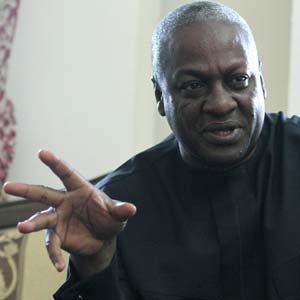 |
|
|
|
|||||||||||
Developing nations now have more choices for procuring loans
Emerging countries can now look to China and other new economic powers for development cash, said a leading African politician.
"The rise of BRICS countries like China, Brazil and India gives an alternative to African and other developing countries for much needed investment without having to go through the old rigmarole," said John Dramani Mahama, vice-president of Ghana.
 John Dramani Mahama, vice-president of Ghana, says Africa has resources but not enough infrastructure. [Photo/China Daily] |
Ghana's vice-president was speaking ahead of his visit to Beijing on Thursday to sign a $3-billion loan from the China Development Bank.
Considered the largest loan so far to a West African nation, the money is earmarked for major infrastructure development, including a new gas pipeline, fishing harbors, roads and railway lines.
Mahama, speaking from his official residence at Osu Castle in Accra overlooking the Gulf of Guinea, added Ghana was also in discussions with Brazil to arrange a similar but smaller facility of around $1 billion.
The loan by the China Development Bank, China's largest foreign currency lender, has been subject to significant delays.
It needed third-party approval from the IMF because of Ghana's poor financial status, which means any additional lending has to be scrutinized to avoid it getting into further debt.
The IMF eventually gave the go-ahead in December and Ghana's parliament approved it in February.
Gong Jianzhong, China's ambassador to Ghana, said he could not understand the delays.
The memorandum of understanding was signed during the visit of Ghanaian President John Atta Mills to China in September 2010.
"I have no idea why this loan has been blocked for more than a year. Ghana is at a crucial stage of its development - like China was 30 years ago - and needs help from outside to develop its infrastructure," said Gong.
The new loan has been criticized on the grounds that Chinese companies will be key beneficiaries from the infrastructure work.
Mahama insists, however, there are provisions for Ghanaian and other companies to get 40 percent of the contracts.
"It is not like China is giving us $3 billion with one hand and with the other coming back and taking all the contracts and their money back," he said.
He insisted that building infrastructure was vital to the country's development with its poor roads and other facilities wiping an estimated 3 percent off the country's GDP.
"If you have resources but don't have the infrastructure to exploit those resources then they are useless. You can't move your products if you don't have good roads, and if you don't have bridges a lot of the country is inaccessible. You need to expand power production in order to be able to feed industries and our energy demand is estimated to grow by anything between 7 and 10 percent per annum," he said.
"China has a growing economy and needs natural resources and Africa has these natural resources but also needs money for development so it becomes a win-win for them to come together and develop closer cooperation," he said.
Deng Yanting, a researcher with the Chinese Academy of Social Sciences, said the shift in African countries' financial partnerships from the West to emerging powers like China and India will certainly play a significant role in the future world financial system.
"The international financial system is experiencing profound changes and the fact that Africa is seeking more help from emerging powers will give developing countries more voice and common ground in the reform process," he said.
Mahama insisted Africa was changing and could be one of the economic success stories of the 21st century. Ghana itself has benefited from double-digit economic growth in recent years.
"In the past, Africa was only mentioned in any medium of mass communication when there were civil wars, droughts, famines where children were dying. This is the picture painted in people's minds by the media and as a result they don't see what is changing in Africa," he said.
Contact the writers at [email protected] and [email protected]
Li Lianxing contributed to this story in Beijing.